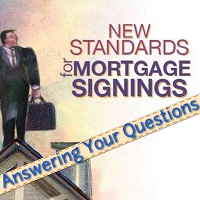 Editor’s Note: This is the fifth in an ongoing series of commentaries analyzing the individual Guiding Principles of the Notary Signing Agent™ Code of Conduct, released by the Signing Professionals Workgroup in October 2013.
Editor’s Note: This is the fifth in an ongoing series of commentaries analyzing the individual Guiding Principles of the Notary Signing Agent™ Code of Conduct, released by the Signing Professionals Workgroup in October 2013.
Guiding Principle 5 of the Notary Signing Agent Code of Conduct reads: “The Notary Signing Agent will not perform an illegal, deceptive or harmful act in connection with a signing assignment and will report any suspicious activity to the closing agent handling the transaction.”
Mortgage fraud has been on the rise in recent years, and loan origination fraud is widely regarded as the most common type according to a March 2014 report by the Office of Inspector General of the U.S. Department of Justice. Loan origination fraud typically involves a borrower or industry insider who misstates, misrepresents or omits information on a mortgage application that causes a lender to fund, purchase or insure a mortgage loan. Other types of mortgage fraud include foreclosure rescue, loan modification and short sale scams.
The Code of Conduct prohibits a Notary Signing Agent from engaging in acts of fraud, whether alone or in concert with others. In particular, the Code expressly prohibits a Notary Signing Agent from performing the following fraudulent acts that could contribute to fraud:
- Notarizing the signature of a signer who is not physically present (Standard 5.1)
- Pre- or post-dating a notarial certificate with a date that is not the date on which the signer actually appeared before the Notary Signing Agent to have his or her signature notarized (Standard 5.2)
- Falsifying information in a closing document or notarial certificate (Standard 5.3)
- Mailing an extra signed and sealed notarial certificate not securely attached to an actual closing document notarized by the Notary Signing Agent (Standard 5.4)
- Presenting only the signature page, and not all pages of the document, for signature by a borrower (Standard 5.9)
In addition, the Code requires the Notary Signing Agent to inform the lender’s representative and closing agent for the transaction if the Notary Signing Agent witnesses any suspicious activity in connection with performing signing services and outlines several specific activities to report:
- The signer appears unaware of the loan or the significance of the transaction or is being pressured or improperly influenced to sign documents, or possesses a physical disability requiring accommodation that the Notary Signing Agent has not been trained or authorized to perform (Standard 5.6)
- The signer affixes a signature that appears to be overtly inconsistent with the signature affixed in the Notary Signing Agent’s Notary journal and which appears on the signer’s written identification (Standard 5.7)
- Documents in the closing package are incomplete or contain blank spaces (Standard 5.8)
- Actual or potential misrepresentation or falsehood known or witnessed by the Notary Signing Agent in connection with a transaction (Standard 5.10)
- A transaction the Notary Signing Agent reasonably believes is unlawful (Standard 5.11)
- Evidence of or a reasonable belief that a document or notarial certificate in the closing package has been tampered with (Standard 5.12)
The Code obliges the Notary Signing Agent to report suspicious activity to the lender’s representative and closing agent for the transaction because both have an interest in mitigating any potential losses that could result.
There are occasions when attorneys in fact sign on behalf of the borrower, which can be a potential suspicious circumstance. In such instances, Standard 5.5 requires an attorney in fact to be approved by the lender’s representative, which usually is done prior to the signing. If use of the attorney in fact is not obtained prior to the signing, Standard 5.5 only requires the Notary Signing Agent to obtain approval from the lender’s representative or closing agent in order to proceed.
Finally, Code Standards 5.13 and 5.14 set the expectation that a Notary Signing Agent will voluntarily disclose knowledge of a criminal act, whether committed personally or by others, to a lawful authority and fully cooperate with any investigation into the alleged criminal activity.
Bill Anderson is Vice President of Government Affairs with the National Notary Association
For a better understanding of the new Notary Signing Agent code, read other commentaries in this series of articles.
The Notary Signing Agent Code Of Conduct: Guiding Principle 1
The Notary Signing Agent Code Of Conduct: Guiding Principle 2
Notary Signing Agent Code Of Conduct: Guiding Principle 3
Notary Signing Agent Code Of Conduct: Guiding Principle 4